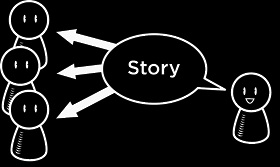Tell the Story
By Anthony Casperson
10-12-19
He seemed sane, other than the unbelievable story that he told. But the scars bore the truth of his story. Self-inflicted wounds and the damage done from breaking bonds of rope and chain covered his body, just now recovering from malnutrition.
The man claimed that his body had not been under his control. The myriad voices within drove him to dwell among the cavernous tombs of the area. They caused him to tear all clothing from his body. Other than the voices, his only company was a man similarly afflicted. No one dared ask what they’d eaten out there.
Beaten and chained up like the feral dogs that they were, the pair had done their fair share in returning the violence to their oppressors. The man wasn’t sure if any of his victims survived his maulings. But their infamous legend pervaded the area. There’s danger out there; don’t go near.
But then one day, some men who didn’t know that the area was dangerous, pulled up their small boat near those tombs. The savage man and his companion raged at the larger group of men. The voices within took control of his words, calling out to the leader of those men. They called him “Jesus, Son of the Most High God.” How did the voices know the name of this man? And why did they fear him, like he were God himself?
The voices continued to converse with the leader, this Jesus. Unclean spirits, he called them. Finally, flooding out of the demon-possessed man (and he supposed his companion as well), the spirits were permitted into some nearby pigs. They fled in terror, drowning the livestock in the lake. Could they have done that to the pair of men if they’d wanted to?
Realizing his nakedness, the man freed from the voices found something to clothe himself. He and his companion sat, listening to the teaching of their Savior. Townsfolk came, ready to fight whatever had been powerful enough to take on the feral pair. Only, what they found was a peace unseen in the area for years. And this freaked them out more. They begged for the leader and his followers to leave the area.
The once-possessed man saw his rescuer leaving and begged to stay with him rather than the angry and confused crowd behind him. But this Jesus told him to stay and tell the story of what had happened. To tell the story of God working in his life, leading him from oppression to freedom.
This is the story that the scarred man told. Throughout the ten nearby cities, the new and true legend permeated. The tale of Jesus the Healer and Savior. It was so pervasive that the next time Jesus went through the area of the Decapolis, people knew who he was and begged him to heal a deaf man (Mark 7:31).
So, what’s the point of this story? Why tell the tale of the demon-possessed man found in Matthew 8:28-34, Mark 5:1-20, and Luke 8:26-39?
I want to point out the value of telling the story of Jesus’ work in our lives. Stories told without hiding the embarrassing parts. Stories told without shame of who or what we used to be. Stories told to give others hope in their stories.
Without the demon-possessed man telling his story, do you think that the deaf man who found Jesus later would have been healed? Though seemingly unrelated, did the latter healing rely on the former story being told so that healing could come to him?
The story that was told likely helped the spread of the gospel through the area even after Jesus’ sacrificial death and resurrection. How many more people came to know salvation through the God-man scarred for them, because another scarred person told their story?
The unfiltered story brought life and hope not only to the one who lived it, but also to those who heard it. The very people who once feared him, now discovered the truth through his life. And in so doing, found life from this Jesus.
And the same can be true of us. Our stories, the pain, the loss, the poor choices, the self-inflicted wounds, the scars and everything that has been made whole at the feet of Jesus, can be used by God to show his healing to others…but only if we tell the story.
Will we put the shame to the side so that the story of Jesus’ work can heal? Or do we doom others to continued pain and suffering because we’re not willing to showcase God’s power through our weaknesses?




